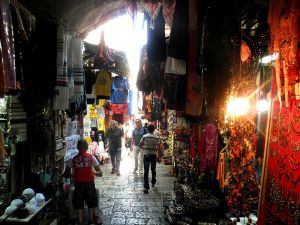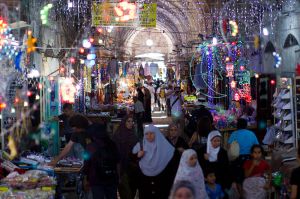Ever traveled someplace where you totally don’t speak the language? Ever suspected, as you wandered around, that the locals were talking about you? I can’t vouch for every local everywhere, and I suppose the odds are probably in favor of the locals actually having things to do. But I can tell you about the Old City of Jerusalem, and in the Old City? They’re talking about you.
I’ve been to Jerusalem before, and I’m surprised at how much of the layout of the Old City I remember. Better yet, when I get lost, I can just step to the side of the flowing river of tourists and close my eyes and envision the map of the Old City that hung on my wall for my whole childhood. I’ve always thought the Old City looks a little bit like a big, shaggy-haired lion, with the Temple Mount at its nose. I orient myself and move on. It’s not like I’m going anywhere in particular: the city itself is the attraction.

It doesn’t take me long to notice that things are a little different this time. I’m distracted by the difference between the people here and my community in Jordan. Physically they look alike and they are dressed alike, but this is a tourism-based economy and my interactions with the people I meet are vastly different. Nobody is surprised to see me here, nobody is that interested in me as a person, and it isn’t really fair to demand that they treat me like one of their sisters. But it still feels weird, all these men talking to me.
I clearly read as American, but also clearly as a backpacker, so as I walk down one alley and up another the solicitations are only half-hearted. “Come see, traditional hats,” one guy says, gesturing toward a basket of hats made out of old fabric. But he barely looks up. The guy across from him looks at me soberly as he cracks a pumpkin seed between the notches in his two front teeth. I am not a special snowflake here. I think it’s refreshing.
Then the funny thing happens. From down the stairs and around the corner I hear a voice. “Italians!” the voice calls, in Arabic. “Church group!”
Mr. Pumpkin Seed hops up and tucks his stool behind the door to his busy shop, even as he pulls out an armload of rosaries. The half-hearted hat merchant dashes inside his own establishment and comes back out with maps of the Via Dolorosa and two artistically rendered crowns of thorns. Their body language is eager and engaging. I watch transfixed as they pursue the custom of the fresh-faced, early-morning Italians — in Italian.
When the crowd has passed, everybody relaxes again. And then they start talking. “There have been so many Italians,” Pumpkin Seed says. “They just don’t buy as many postcards. We need more Americans.”
Another merchant says “Eh, Americans haggle too much. I don’t care whose money I take if they’re spending.”
The hat merchant looks up and seems to notice me. We both realize I’ve been standing there a little too long and a little too awkwardly. He looks at me quizzically, and I scamper down the stairs and away. I’ve learned I can eavesdrop, and I’m not quite ready to give up my little secret!

My parents like to stay at the Notre Dame property when they’re in Jerusalem. It’s a lovely building owned and maintained by the Vatican. It isn’t a five-star western experience, but what it lacks in amenities it more than makes up in character. And it’s right across from the Old City.
The drawback I’m noticing now, however, is that it’s right across from the wrong end of the Old City. Specifically: it’s at the top of the hill. And after a day tromping around the never-flat alleyways of old Jerusalem, hauling myself back up to the New Gate is exhausting.
I take the steps slowly, grateful for the shade, and reflecting on the day. It’s been a weird experience. I was overwhelmed by the consumer crap in the touristy areas of the city, and the loud, immodestly dressed tourists who were buying that crap. I realize that I was that tourist, the last time I was here. After several hours, I’d found myself in the Arab quarter, surrounded by ishaar-clad ladies going about their business, and I’d realized I felt much more comfortable there. Then I’d realized that people were staring at me, indirectly, when I wasn’t looking. Was it the staring that felt comfortable? Is this what happens to people who live like I’m living? Is it ego? There’s a lot to think about.
I’m almost at the New Gate now and I look at my watch. It isn’t quite time for dinner, but I know that my mother — who has been so sick in the heat that she has stayed close to the hotel — will probably be hungry. The road out of the New Gate isn’t heavily touristed, so the shops here are more like little 7-11s crammed in Byzantine archways. I stop at a shop with a pretty display of fruit outside it. As I’m accustomed to buying fruit like this these days, I find the hook in the wall holding the black plastic kees, help myself to one, and start filling it with plums. Nobody seems to notice.
When I’m ready, I enter the shop and find three older, mustachioed men seated around a backgammon board. They look up at me without particular surprise. The one in front says, in English, “Would you like anything else?”
I’m tired, so I answer in English. “Yes, please. Two Diet Cokes and a big bottle of water.”
The second man turns to the cooler to retrieve my items without standing. Then it happens. The third man says, in Arabic, “How much do we charge Americans for drinks?”
I have absolutely had it. Questions of identity aside, my new powers of eavesdropping haven’t left me in a very good mood today, and I’m hot and tired. I know my Arabic gets worse when I’m mad, but I still manage to be coherent enough to let the gentleman know that I speak Arabic, that I know how much a bottle of water costs, and that he’s brought shame to his mother and all his family.
All three men burst into laughter. The one on the left, who appears to be in charge, jumps up and cheerfully gestures for me to sit in his seat. He disappears and returns immediately with a cup of tea and a plate of dry biscuits, which he sets on my knee. When the rearranging and feeding and laughter has died down somewhat, he says, “Okay, tell us all about you!”
I spend the next half an hour in a delightful conversation about life, the universe, and everything. We even have an interesting linguistic digression when I ask them to weigh my plums. I use the word with which I’m familiar, khoch, and one of my new friends shakes his head. “These aren’t khoch, they’re durag,” he says, using the word for “peach.” I argue back that I know what a peach is. He doesn’t have any peaches on hand, but after some intense conversation we come to the conclusion that the Palestinian and Jordanian dialects do, in fact, just use opposite words for these two fruits. “It’s the Bedouin,” one man says. “They don’t know what they’re talking about.”
When I finally leave, I am carrying not only my purchases, but some cookies for my poor sick mother ya haram, and an enthusiastic invitation to come back tomorrow for more tea.

I can’t help myself, of course, so I do choose the same dukan the next day on my way back to my mother. I am immediately welcomed, given a seat, and provided with tea and snacks. There are two additional men here today, a bit younger, who greet me without surprise and have clearly been told all about me. Conversation is once again pleasant and comfortable and I’m glad I stopped by.
I am just getting ready to collect more beverages and some bread when a tourist couple walks in. The man is literally wearing a fanny pack — even I gave that up, once my mother was no longer packing for me — and a big, floppy hat; his wife is wearing a sleeveless shirt and tiny shorts that barely reach beyond her backpack. They walk straight into the little shop and speak in carefully enunciated English, a little louder and a little slower than is strictly necessary. But the best part is: they address their questions to me.
“How much for water?” Mr. Tourist over-enunciates.
I’m not sure what to do. In my moment of hesitation, the shop owner leans forward a bit and says to me, in Arabic and under his breath, “Go on!”
I manage to stammer out a price. The couple takes my discomfiture for linguistic disability and carefully, slowly, asks for two bottles of water and a newspaper. I put the water and the paper in a black kees, take the money, and hand the bag over. Mr. Tourist half-bows to me, as if we were in Asia somewhere, makes direct eye contact with me, and says “Shukran.”
There are many, many hard moments in my time in the Middle East. There are times I’ve hated the people around me, literally hated them, hated everything about it in what the psychology manual assures me is totally normal stage-three culture shock. I’ve cried, and I’ve been homesick, and I’ve wanted to throw things.
But these moments? The moments of genuine, uproarious laughter, when something I’ve said or done or had said or done to me is so innocently funny that the humor crosses cultural lines and brings total strangers to a beautiful moment together? These moments are worth it. I know I’ll never see these men again, but I also know we’ll never forget this moment, right here and now.

Lovely, hilarious, thoughtful, beautiful story! Also had to chuckle at the bottom, where the tourist “half-bows…as if we were in Asia somewhere.” As the PC wittily impressed upon you when you received your assignment, technically, you are in “Asia somewhere.”
I did not make you use fanny packs! And I was really proud of you as we walked through the Old City and the chatter down the street was to watch you and to engage you and remember that you spoke Arabic! That was such a wonderful moment for me, too.
In our society, 18 is the age of consent. The photos of me under age 18 (Moscow, China, etc.) wearing a fanny pack are therefore your fault. Fini. 😛
I love this one!